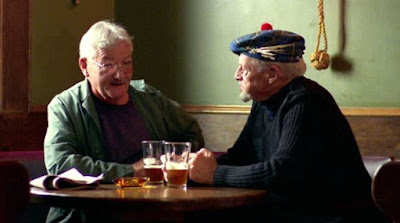SURVEYING LABOUR’S savagely diminished caucus, only two MPs stand out as credible future leaders: Kieran McAnulty and Ginny Andersen. Before such a combination could accede to the leadership, however, both the Labour caucus and the Labour Party would have to undergo a profound reconfiguration.
For a start, the party membership and a clear majority of the caucus would need to have rejected neoliberalism as Labour’s economic lodestar. The malign legacy of Michael Cullen – for thirty years the party’s ruthless enforcer of neoliberal dogma – needs to be scrubbed off Labour’s escutcheon. Meaning, of course, that Grant Robertson’s legacy (such as it is) would also need to be cleared away. Robertson’s almost childlike dependence on Cullen (especially in the Sixth Labour Government’s first year) meant that new economic thinking had almost no chance of emerging under either Jacinda Ardern or Chris Hipkins.
In the absence of an ideological break-out on a par with the Fourth Labour Government’s adoption of neoliberalism between 1984-1990, there can be no solidity to the radical programme Labour will need if it is to restore its level of voter support to at least 35 percent of the Party Vote. If Labour’s economic and fiscal policies are not being decried as dangerous lunacy by the Coalition Government (as were the First Labour Government’s) then the party and the caucus are not doing their job. Something along the lines of the US Democratic Party Left’s “Green New Deal” and/or the British Labour Party’s “For the Many, Not the Few” 2017 manifesto, would constitute a useful starting-point.
Just getting that far, however, presupposes an extraordinary amount of intra-party conflict. A substantial chunk of the New Zealand Council would need to be replaced. A new and charismatic party president would need to be elected, and a new General Secretary appointed. Only once these bridgeheads were seized could the necessary reforms of Labour’s constitution be implemented. These would restore full control to the party membership over both the choice of the party leader and the formulation of party policy. (No more Captain’s Calls!)
The only possible source for the political heft required to make any of this happen is the Labour Party’s affiliated trade unions – backed-up by the Council of Trade Unions. Something in the form of a manifesto for organised labour, perhaps? A radical document, pointing the way towards reclaiming the Treasury Benches for ordinary working people in three years or less, might be a useful way of mobilising those elements in Labour feeling let down by the party’s parliamentarians. Such a manifesto might also serve as a back-stiffening device for caucus members not willing to wait the six-to-nine years before it could, again, be “Labour’s turn” at the crease.
Fortunately for those who see democratic government as something more than a glorified game of parliamentary beach cricket, the Coalition Government and its policies are certain to drive its victims decisively towards the Left. Even the likes of Hipkins and Carmel Sepuloni will have to at least feign anger and a determination to offer New Zealanders something better than vicious austerity for the poor, and special favours for the Right’s most generous donors. What Hipkins and Sepuloni are likely to discover, however, is that, having climbed on the back of the left-wing tiger, getting off it, uneaten, can be a little tricky.
Certainly, it will not take very long for Labour’s leadership deficit to be cruelly exposed by the surfeit of political leadership to Labour’s left. Against the dynamism and inspiration on display from both the Greens and Te Pāti Māori, Hipkins and Sepuloni will need to be selling the working class and rangatahi something just a little more appetising than bread and butter. It is, arguably, the only good reason for keeping Hipkins and Sepuloni in place: to give them the time necessary to demonstrate their utter incapacity to front the sort of rejuvenated Labour Party that will be required to win in 2026.
Limiting the Coalition’s tenure to “Three Years – And Not One Day More!” is a campaign in which all three of the left-wing parties could participate eagerly. Anticipating the three-party coalitions which now, and for New Zealand’s immediate electoral future, appear unavoidable, Labour, the Greens and Te Pāti Māori could grow comfortable with each other, and gain confidence, by demonstrating their combined political effectiveness to a public growing increasingly impatient with the Right’s performance.
It is even possible to contemplate the three left-wing parties, the trade unions, and Māori organisations coming together in a national hui dedicated to explaining the shape and purpose of the “New Aotearoa” that must now – in the face of the Right’s reactionary agenda – be the core objective of all progressive New Zealanders. Such a gathering would be a wasted exercise, however, if it was not also the opportunity for an open-ended and free-wheeling debate concerning the constitutional shape of the New Aotearoa. If Te Tiriti o Waitangi is to lie at the heart of that new nation, then its defenders must be brave enough to let it face and answer Pakeha fears, even as it carries Māori hopes aloft.
Rather than making a free discussion, even a referendum, about the principles of the Treaty something to be avoided at all costs – up to and including threats of violence if it is allowed to go ahead – wouldn’t the needs of Māori, and the Left, be best served by embracing the process and making it their own? Why not go to the country in 2026 with plans for a full constitutional convention? Why not promote the election of 120 constitutional delegates to draft Aotearoa’s first written constitution – with Te Tiriti at its heart? Where could the Right go then?
The sixth century BC Chinese military strategist-cum-philosopher, Sun Tzu, wrote: “Thus, what is of supreme importance in war is to attack the enemy’s strategy.” The Right has observed the unwillingness of Māori to engage in open debate about Te Tiriti, its principles, and the co-governance it more-or-less mandates, and they have made that unwillingness their strategic target. The harder Māori resist the call for a full debate on the Treaty, the harder the Right will push for that debate to be forced upon them. Their goal is to keep Māori on the defensive. Sun Tzu would say: “Stop doing what your enemy wants you to do. Do what he does not expect, and has not prepared for – embrace the debate, and win it.”
Flexible thinking and political courage are the qualities most needed by the New Zealand Left as it campaigns to restrict the National-Act-NZ First Coalition to a single term. For better or for worse, it is the New Zealand Labour Party that will determine whether the Left is successful, or unsuccessful, in its endeavours.
Paradoxically, the battle against the right-wing coalition can only be fought with any prospect of success after the battle against the right of the Labour Party has been successfully concluded. If Labour is not committed to progressive change, then it will not happen. But, against a united and progressive Labour Party: a Labour Party backed by its allies on the Left, the trade unions, and the rangatahi of Aotearoa; no combination of the Right has ever, or will ever, prevail.
This essay was originally posted on The Democracy Project website on Monday, 18 December 2023.













